- Home
- H. P. Lovecraft
Writings in the United Amateur, 1915-1922 Page 4
Writings in the United Amateur, 1915-1922 Read online
Page 4
THE UNITED AMATEUR MARCH 1915
DEPARTMENT OF PUBLIC CRITICISM
THE BLARNEY STONE for November-December is dedicated to its contributorsand wholly given over to their work. "Did You Ever Go A-Fishin'?," byOlive G. Owen, is a vivid poetical portrayal of that peculiar attractionwhich the angler's art exerts on its devotees. While the whole is ofhigh and pleasing quality, exception must be taken to the rhyming of"low" with itself at the very beginning of the poem. It may be that thesecond "low" is a misprint for "slow", yet even in that case, the rhymeis scarcely allowable, since the dominant rhyming sound would still be"low". Miss Edna von der Heide, in "The Christmas of Delsato's Maria",tells how an Italian thief utilized his questionable art to replace aloss in his family. "To General Villa" is a peculiar piece of versewritten last summer for the purpose of defying those who had charged itsauthor with pedantry and pomposity. It has suffered somewhat at thehands of the printer; "Intrepido" being spelled "Intrepedo", and theword "own" being dropped from the clause "your own name can't write" inthe third line of the second stanza. Also, the first of the Spanishdouble exclamation marks around the oath "Santa Maria" is right side upinstead of inverted according to Castilian custom. Having been hastilywritten, the piece is wholly without merit. "Senor", in the second lineof the third stanza is placed so that the accent must fall erroneouslyon the first syllable. The changes of time and revolutions have renderedthe last stanza sadly out of date.
The issue is concluded with a beautiful editorial on "The Service WithLove", wherein is described the ideal spirit of brotherhood which shouldpervade amateur journalism. We regret the two blank pages at the back ofthe magazine, and wish that some talented Blarney had seen fit to adornthem with his work.
THE BROOKLYNITE for January is of unusual merit, fairly teeming withfeatures of a well-written and substantial character.
The short story by Mrs. Carson is developed with admirable simplicityand ease; the plot not too strained, and the moral not too pragmaticallyforced upon the reader. The conversation, always a difficult point withamateur authors, is surprisingly natural.
Mrs. Adams' essay on ghosts displays considerable literary knowledge,though the anecdote at the end is rather ancient for use today. We lastheard it about ten years ago, with a Scotchman instead of a negropreacher as the narrator, and with the word "miracle" instead of"phenomena" as the subject.
Mr. Goodwin's "Cinigrams" are delightful, and we expect soon to hear theauthor heralded as the Martial of amateur journalism. "Ford, Do NotShake", Mr. Goodwin's parody on Kleiner's "Heart, Do Not Wake", isactually side-splitting. The metre is handled to perfection, and thehumor is extremely clever.
"Consolidation", by George Julian Houtain, is a fair example of themanner in which some of the less dignified National politicians try tocast silly aspersions on the United. The elaborately sarcastic phrase:"United boys and girls", seems to please its author, since he uses ittwice. There is unconscious irony in the spectacle of a National man,once a member of the notorious old Gotham ring, preaching virtuouslyagainst the "unenviable record" of the United.
Mr. Stoddard's brief essay, composed at a meeting of the Blue PencilClub, is excellent, and his concluding quatrain regular and melodious.We wish, however, that he would give us some more of the serious fictionthat he can write so splendidly, and which used several years ago toappear in the amateur press.
"Music Moods", by Charles D. Isaacson, is an emotional sketch of greatpower and delicate artistry. Mr. Isaacson has an active imagination anda literary ability which makes his readers see very vividly the imageshe creates.
Mrs. Houtain's poem shows great but as yet undeveloped talent. Therepeated use of the expletive "do" in such phrases as "I do sigh", or "Ipray and do pine", mars the verse somewhat. As Pope remarked andhumorously illustrated in his Essay on Criticism:
"Expletives their feeble aid DO join."
Mr. Ayres' jocose epic is clever and tuneful. The climax, or ratheranticlimax, comes quite effectively.
Mr. Adams, in his brilliant verses entitled "Gentlemen, Please Desist",exposes in a masterly way the fatuity of our loud-mouthed peace workers.Miss Silverman's lines on the same subject are very good, but scarcelyequal in keenness of wit. It is all very well to "keep industrybooming", but industry cannot take the place of military efficiency inprotecting a nation against foreign aggression.
As a whole, the January Brooklynite is the best number we have yet seen.
THE COYOTE for March is not a revival of Ex-President Brechler'swell-known amateur journal of that name, but a semi-professional leafletedited by Mr. William T. Harrington, a rather new recruit. The leadingfeature is a sensational short story by the editor, entitled "WhatGambling Did". In this tale, Mr. Harrington exhibits at least a strongambition to write, and such energy, if well directed, may eventuallymake of him one of our leading authors of fiction. Just now, however, wemust protest against his taste in subject and technique. His models areobviously not of the classical order, and his ideas of probability arefar from unexceptionable. In developing the power of narration, it isgenerally best, as one of our leading amateurs lately reiterated, todiscard the thought of elaborate plots and thrilling climaxes, and tobegin instead with the plain and simple description of actual incidentswith which the author is familiar. Likewise, the young author may avoidimprobability by composing his earliest efforts in the first person. Heknows what he himself would do in certain circumstances, but he does notalways know very exactly what some others might do in similar cases.Meanwhile, above all things he should read classic fiction, abstainingentirely from "Wild West Weeklies" and the like. Mr. Harrington has ataste for excitement, and would probably thrive on Scott, Cooper, orPoe. Let him read the Leather Stocking Tales if he loves pioneers andfrontier life. Not until after he has acquired a familiarity with themethods of the best authors, and refined his imagination by a perusal oftheir works, should he make attempts at writing outside his ownexperience. He will then be able to produce work of a quality whichwould surprise him now.
We are sorry to note that the Coyote's editorial columns are occupied bya mere condensed copy of the United's standard recruiting circular. Thisspace might have been filled much more profitably with brief originalcomments by the editor on the numerous exchanges which are listed inanother part of his paper. The paid advertising and subscription priceare not to be commended. Such things have no place in a truly amateurpaper. But continued membership in the United will doubtless fill Mr.Harrington with the genuine amateur spirit, and cause The Coyote tobecome a worthy successor to its older namesake.
DOWDELL'S BEARCAT for October is a modest but very promising littlepaper, mostly composed of amateur notes and brief reviews. The editorhas interest in his work, and fluency in his language, foundations onwhich a more elaborate structure may some day be erected. One featureopen to criticism is Mr. Dowdell's sudden change in his editorial columnfrom the usual first person plural to the third person singular. Itwould be better to save "The Old Bear" and his interesting chat, for aseparate column. The typography of Dowdell's Bearcat is not perfect, butmay be expected to improve from issue to issue.
THE EMISSARY for July is a National paper, but contains the work ofseveral United members. Of the publication itself we need not stop tospeak. Mr. Reading, though only eighteen years of age, is an editor andprinter of the highest grade, and has produced an issue which will belong remembered in the amateur world.
"Ausonius, the Nature-Lover", by Edward H. Cole, is a pleasing andjudicious appreciation of a later Latin poet, showing how a bard of thedecaying Roman Empire approached in certain passages the spirit ofmodern romanticism. Mr. Cole's translated extracts are beautifullyphrased, and his comment upon the subject well exhibits his wide andcareful scholarship. Articles of this quality are rarely found in theamateur press, and it will be interesting to note what effect their morefrequent appearance would have upon the literary tone of theassociations.
"To Sappho", by Olive G. Owen, is a lyrical poem of mu
ch merit, yethaving a defective line. Why, we wonder, did the author see fit to leavetwo necessary syllables out of the third line of the opening verse?
"Lamb o' Mine", by Dora M. Hepner, is probably the most attractive bitof verse in the magazine. The negro dialect is inimitable, and theconsoling spirit of the old black "mammy" fairly radiates from thelines. Metrically, the piece is faultless, and we wish its author were amore frequent contributor to the amateur journals.
Miss von der Heide's two poems, "The Mill Mother", and "Greeting",express admirably the sentiments of pathos and natural beauty,respectively. Personally, we prefer "Greeting".
Mr. Campbell's lines on "Huerta's Finish" are distinctly below the usualstandard of this talented writer's work. The metre is satisfactory, butthe humor is somewhat strained, and the pun in the last line based on amispronunciation of the old Indian's name. "Wehr-ta" is probably thecorrect sound, rather than "Hurt-a".
THE INSPIRATION for January must be judged strictly by its quality; notits quantity. Pinkney C. Grissom, a very young amateur, cheers usgreatly with his article on "Smiles", while Miss von der Heide'smicroscopic story, "A Real Victory", is indeed a literary treat. Wetrust that the editor's threat of discontinuance may not be realized.
THE KANSAN for July reaches us at a late date through the kindness ofMr. Daas. In this magazine the Sunflower Club of Bazine makes its formaldebut, being ushered into amateur society by means of a pleasing andwell-written article from the pen of Miss Hoffman. The informal"Exchange Comment" is a charitable and generally delightful department,whose anonymity we rather regret. The Editorial pages are brilliant intheir justification of the United's sunny spirit, as contrasted with theNational's forbidding frigidity.
THE OLYMPIAN for September-February well sustains the lofty traditionsof that magazine. Mr. Cole defines with considerable precision hislatest editorial policy and his true attitude toward the United,revealing only the more strongly, however, his remarkable andineradicable prejudice against our association in favor of the National."Evening Prayer", by Rheinhart Kleiner, is a poem of great beauty andreal worth, couched in the alternating iambic pentameter and trimeterwhich this poet seems to have made his own particular medium ofexpression. Mr. Kleiner is rapidly assuming a very high rank amongamateur poets.
"The Public Library", by Eloise N. Griffith, is a delightful andappreciative reminiscence of quiet hours of lettered joy.
"The Play Hour", consisting of two clever bits of metre dedicated to avery young amateur, appears in a collection of short and sprightlypieces signed by the Senior Editor himself. It is difficult,nevertheless, to imagine the dignified Olympian Zeus as the author.Though the second of these tuneful rhymes is apparently written in the"simplified" spelling now so popular among certain amateur editors, acloser inspection reveals the fact that the spelling is merely madejuvenile to suit the subject. After all, however, simplified spellingand baby-talk are but little removed from each other. The Reviewers'Club is in this issue represented by both editors, whose criticisms areas usual just and illuminating.
PROMETHEUS for September-November is a journal of unusual literary andartistic value, edited by our poet-laureate, Miss Olive G. Owen. Thepaper well lives up to its sub-title, "A Magazine of Aspirations Dreamedinto Reality". Mr. William H. Greenfield, the honored founder of theUnited, claims the first page with a graceful Pindaric ode, "To MyFriend". "The Weaver of Dreams", by Edna G. Thorne, is a strikinglywell-written short story pervaded with a delicate pathos and expressinga beautiful Christian philosophy. George W. Macauley, continuing toconcentrate his narrative powers on the Oriental tale, presents apleasing fable of old Moorish Spain, entitled "Ali Ahmed and theAqueduct". "The Ethics of Stimulation", by Maurice W. Moe, is aneminently sound exposition of the relative evil of coffee and alcoholicliquor as stimulants. "Partners", by H. A. Reading, exhibits greatability on the part of its author, and is well calculated to arouse theemotions of affectionate fathers and sons.
Miss Owen's work, scattered here and there throughout the magazine, isnaturally of the very first quality. It is hard to choose between thetwo poems "Atthis, I Love Thee", and "To Elizabeth Knopf", but weincline slightly toward the former. The sketches "The Visitor" and "SomeThings I Like in New York" are both delightful in their artisticsimplicity.
Critically analyzed, Prometheus may be classed as one of the most variedand generally readable magazines of the season.
RED LETTER DAYS for October is the first of an informal individual paperby George W. Macauley, representing the most purely personal phase ofamateur journalism. This issue is almost completely devoted to ananimated account of the "Red Letter Days" spent by Mr. Macauley lastsummer with the amateurs who stopped to see him while on their way tothe various conventions. The author's style is familiar and pleasing,though rather careless, and slightly marred by defects in spelling andgrammar. For instance, we are told of the caution which he and Mr.Stoddard exercised in changing seats in a boat, since neither "couldswim, had the boat DID the usual thing." We are sorry that Mr. Macauleyhas adopted "simplified" spelling, but it is an evil in which he is byno means alone.
Red Letter Days, broadly considered, is a highly commendable paper; itssimplicity and lack of affectation are alone sufficient to win generalapproval.
STRAY LEAVES for May-June is another paper which has arrived late andindirectly. In this publication we note with disapproval some evidenceof pseudo-professionalism, such as a subscription rate andadvertisements, but we trust that Miss Draper will ere long acquire theperfect amateur spirit. "Love Proved To Be the Master of Hate", a shortstory by Frances Wood, is handicapped by its unwieldy title. "TheTriumph of Love", or some heading of equal brevity, would better suitit. Indications of immaturity are here and there perceptible, and at thevery beginning there is an inexplicable mass of hyphenation. However,the tale is undeniably of considerable merit, conveying a pleasingpicture of jealousy overcome.
The Editorial department might be improved by a judicious copying of thebest amateur models. The reference to anti-Suffrage and Suffrage as "twovital questions" is hardly permissible; these are the two sides of onlyone question.
"Thinkers", by G. D., is really excellent as an essay, despite theawkwardness of style.
The Bermuda letter is highly interesting in its descriptions, butpainfully unscholarly in its phraseology. We here behold a case of realtalent obscured by want of literary polish, and hope that F. A. B.,whoever he or she may be, will profit by his or her connection with theUnited.
Stray Leaves has great possibilities, and will doubtless prove one ofthe leading papers of amateur journalism in times to come.
THE UNITED OFFICIAL QUARTERLY for January hardly lives up to theartistic standard set by the first number, though it contains muchvaluable matter. Herbert B. Darrow pleads very ably for the personalacknowledgement of amateur papers received, while Paul J. Campbellwrites convincingly on the true value of amateur journalism. Pres.Hepner, in the concluding article, opposes with considerable vigor theHoffman policy of issuing co-operative magazines. We are not, however,inclined entirely to agree with our executive's conclusions. Theco-operative journal is practically the only adequate medium ofexpression for the amateur of limited means, and most of the laterjournals of this class, of which the Official Quarterly is itself anexample, have been of excellent quality. It is perhaps too much toexpect the average President, encumbered with a host of other duties, toconduct this work, but in any event some suitable official should bedelegated for that purpose. The association should not lightly abandon apolicy which made the preceding administration one of the most brilliantand successful in years.
THE WOODBEE for January exhibits amateur journalism at its best. Mrs.Anne Tillery Renshaw opens the magazine with a pleasing poem, dedicatedto the Woodbees, which combines simplicity of diction with regularity ofmetre. Those decasyllabic quatrains are a decided departure from Mrs.Renshaw's usual style, which explains the slight lack of fluency. Thelast line of the third stanza contains a redundant syllable, a d
efectwhich might be corrected by the removal of the article before the word"louder", or by the poetical contraction of "sympathy" into "symp'thy".The third line of the fourth stanza possesses only four feet. This maybe an intentional shortening to give rhetorical effect, yet it mars nonethe less the symmetry of the verse.
"The Spiritual Significance of the Stars", by Leo Fritter, is theleading feature of the issue. The inspiring influence of astronomicalstudy on the cultivated intellect is here shown to best advantage. Mr.Fritter traces the slow unfolding of celestial knowledge to the world,and points out the divinity of that mental power which enables man todiscern the vastness of the universe, and to comprehend the complexprinciples by which it is governed. In the laws of the heavens he findsthe prototype of all human laws, and the one perfect model for humaninstitutions. Mr. Fritter's essay is eminently worthy of a place amongthe classics of amateur journalism.
"A Morn in June", by Harriet E. Daily, is a short and dainty poem ofexcellent quality, though marred by a reprehensible attempt to rhyme"grass" with "task". As we mentioned in connection with another amateurpoem, a final consonant on one of two otherwise rhyming syllablesutterly destroys the rhyme. "We Are Builders All", by Elizabeth M.Ballou, is a graceful allegory based on the temple of Solomon. EdnaMitchell Haughton's character sketch, "The Family Doctor", is just andwell drawn.
"A Dog for Comfort", by Edna von der Heide, is a meritorious poem ofgloomy impressiveness. We cannot quite account for the defective secondline of the fourth stanza, since Miss von der Heide is so able apoetess. Perhaps it is intentional, but we wish the line were of normaldecasyllabic length. "My Grandmother's Garden", by Ida Cochran Haughton,is a truly delightful bit of reminiscent description which deserves morethan one reading. "A Little Girl's Three Wishes", by Mrs. R. M. Moody,is entertaining in quality and correct in metre. It is a relief tobehold amidst the formless cacophony of modern poetry such a regular,old-fashioned specimen of the octosyllabic couplet. "Two LittleWaterwheels", by Dora M. Hepner, is an exquisite idyllic sketch. In thesecond paragraph we read of a channel "damned" up by a projecting rootof a tree; which somewhat surprises us, since we did not know thattree-roots are accustomed to use profane language. Perhaps the authorintended to write "dammed".
The editorials are brief. In one of them it is stated that the paper issubmitted without fear to the critics AND Eddie Cole. In view of Mr.Cole's scholarly and conscientious critical work, we hope that noreflection upon him is there intended.
H. P. LOVECRAFT, Chairman, Department of Public Criticism.
MARCH
Let other bards with nobler talents sing The beauties of the mild, maturer spring. My rustic Muse on bleaker times must dwell, When Earth, but new-escap'd from winter's spell, Uncloth'd, unshelter'd, unadorn'd, is seen; Stript of white robes, nor yet array'd in green. Hard blows the breeze, but with a warmer force. The melting ground, the brimming watercourse, The wak'ning air, the birds' returning flight, The longer sunshine, and the shorter night, Arcturus' beams, and Corvus' glitt'ring rays, Diffuse a promise of the genial days. Yon muddy remnant of the winter snow Shrinks humbly in the equinoctial glow, Whilst in the fields precocious grass-blades peep Above the earth so lately wrapt in sleep. What sweet, elusive odor fills the soil, To rouse the farmer to his yearly toil! Though thick the clouds, and bare the maple bough, With what gay song he guides the cumbrous plough! In him there stirs, like sap within the tree, The joyous call to new activity: The outward scene, however dull and drear, Takes on a splendor from the inward cheer. Prophetic month! Would that I might rehearse Thy hidden beauties in sublimer verse: Thy glorious youth, thy vigor all unspent, Thy stirring winds, of spring and winter blent. Summer brings blessings of enervate kind; Thy joys, O March, are ecstasies of mind. In June we revel in the bees' soft hum, But March exalts us with the bliss to come.
--H. P. LOVECRAFT.

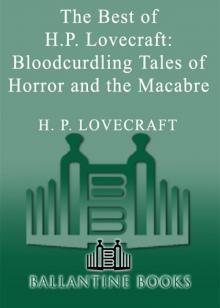 The Best of H.P. Lovecraft
The Best of H.P. Lovecraft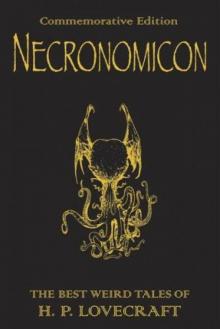 The Definitive H.P. Lovecraft: 67 Tales Of Horror In One Volume
The Definitive H.P. Lovecraft: 67 Tales Of Horror In One Volume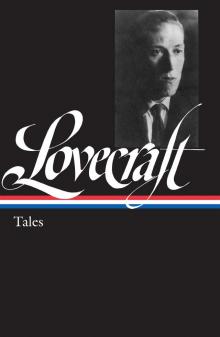 The Complete Works of H.P. Lovecraft
The Complete Works of H.P. Lovecraft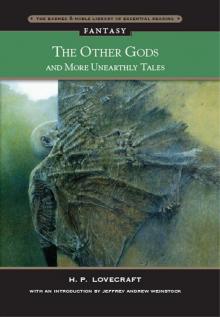 Other Gods and More Unearthly Tales
Other Gods and More Unearthly Tales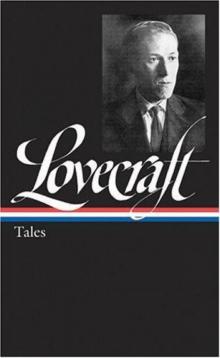 Lovecraft's Fiction Volume I, 1905-1925
Lovecraft's Fiction Volume I, 1905-1925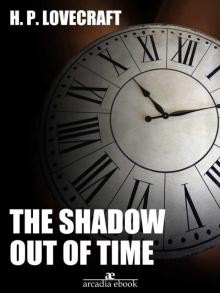 The Shadow Out of Time
The Shadow Out of Time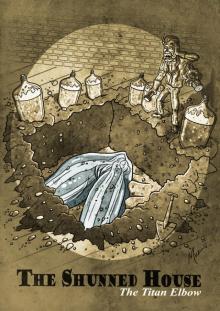 The Shunned House
The Shunned House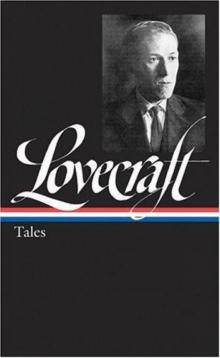 Lovecraft's Fiction Volume II, 1926-1928
Lovecraft's Fiction Volume II, 1926-1928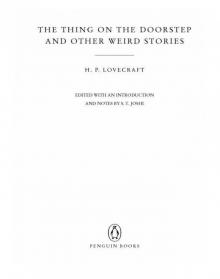 The Thing on the Doorstep and Other Weird Stories
The Thing on the Doorstep and Other Weird Stories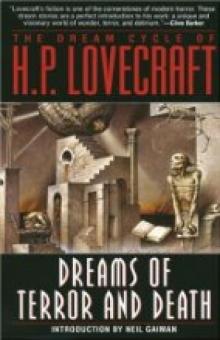 Dream Cycle of H. P. Lovecraft: Dreams of Terror and Death
Dream Cycle of H. P. Lovecraft: Dreams of Terror and Death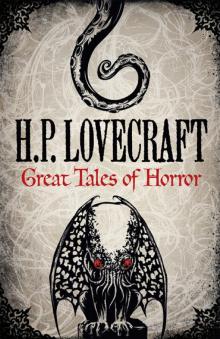 Great Tales of Horror
Great Tales of Horror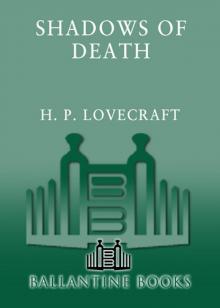 Shadows of Death
Shadows of Death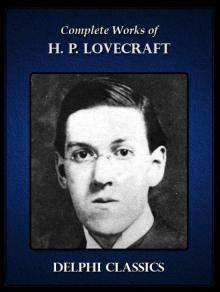 Delphi Complete Works of H. P. Lovecraft (Illustrated)
Delphi Complete Works of H. P. Lovecraft (Illustrated)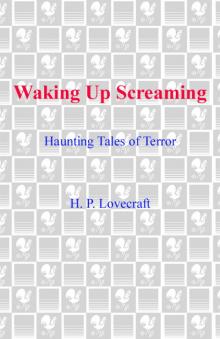 Waking Up Screaming: Haunting Tales of Terror
Waking Up Screaming: Haunting Tales of Terror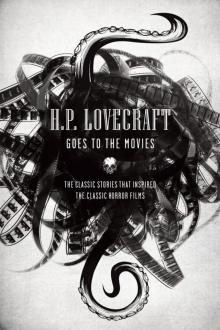 H.P. Lovecraft Goes to the Movies
H.P. Lovecraft Goes to the Movies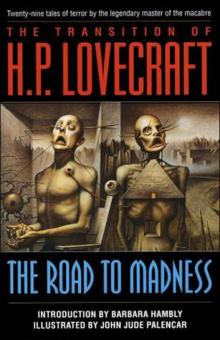 The Road to Madness
The Road to Madness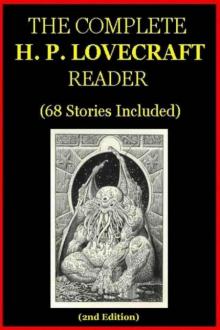 The Complete H.P. Lovecraft Reader (68 Stories)
The Complete H.P. Lovecraft Reader (68 Stories)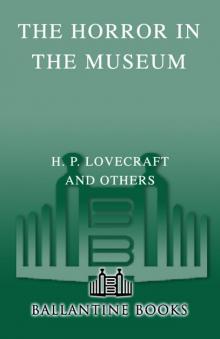 The Horror in the Museum
The Horror in the Museum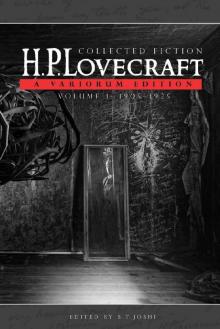 Collected Fiction Volume 1 (1905-1925): A Variorum Edition
Collected Fiction Volume 1 (1905-1925): A Variorum Edition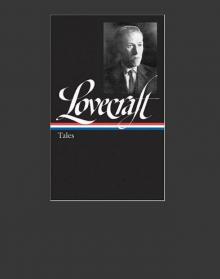 Lovecrafts_Fiction, vol.I_1905-1925
Lovecrafts_Fiction, vol.I_1905-1925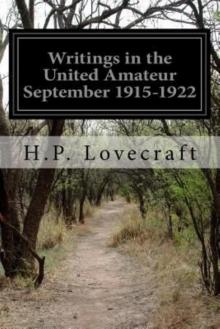 Writings in the United Amateur, 1915-1922
Writings in the United Amateur, 1915-1922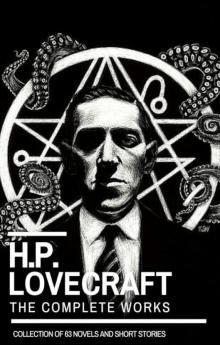 H.P. Lovecraft: The Complete Works
H.P. Lovecraft: The Complete Works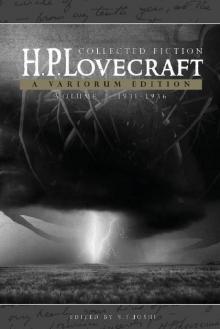 Collected Fiction Volume 3 (1931-1936): A Variorum Edition
Collected Fiction Volume 3 (1931-1936): A Variorum Edition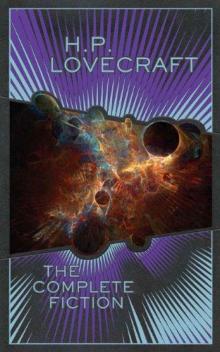 H.P. Lovecraft: The Complete Fiction
H.P. Lovecraft: The Complete Fiction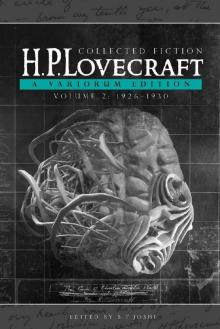 Collected Fiction Volume 2 (1926-1930): A Variorum Edition
Collected Fiction Volume 2 (1926-1930): A Variorum Edition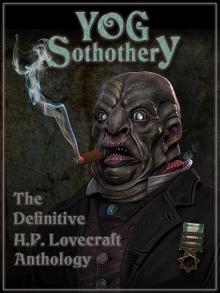 Yog Sothothery - The Definitive H.P. Lovecraft Anthology
Yog Sothothery - The Definitive H.P. Lovecraft Anthology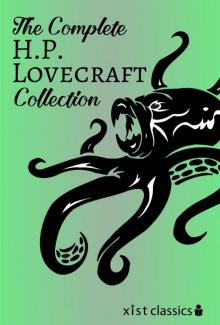 The Complete H.P. Lovecraft Collection (Xist Classics)
The Complete H.P. Lovecraft Collection (Xist Classics)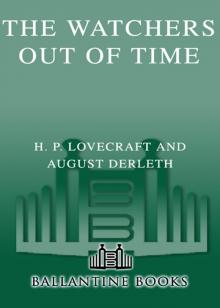 The Watchers Out of Time
The Watchers Out of Time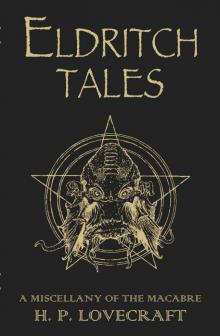 Eldritch Tales
Eldritch Tales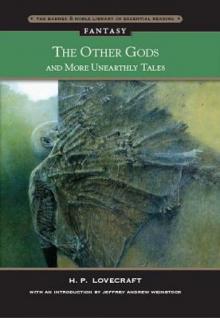 The Other Gods And More Unearthly Tales
The Other Gods And More Unearthly Tales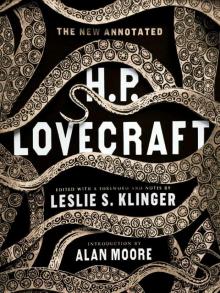 The New Annotated H. P. Lovecraft
The New Annotated H. P. Lovecraft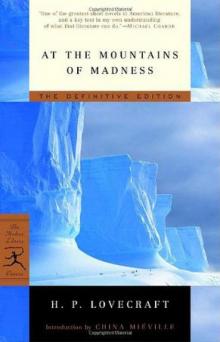 At the mountains of madness
At the mountains of madness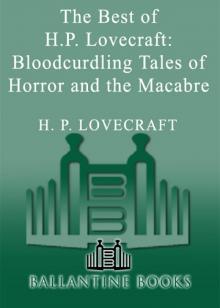 Bloodcurdling Tales of Horror and the Macabre
Bloodcurdling Tales of Horror and the Macabre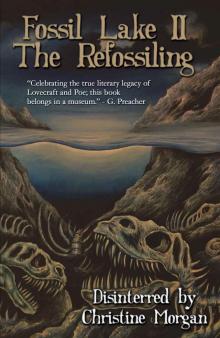 Fossil Lake II: The Refossiling
Fossil Lake II: The Refossiling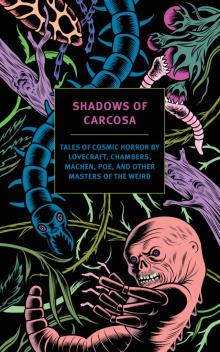 Shadows of Carcosa: Tales of Cosmic Horror by Lovecraft, Chambers, Machen, Poe, and Other Masters of the Weird
Shadows of Carcosa: Tales of Cosmic Horror by Lovecraft, Chambers, Machen, Poe, and Other Masters of the Weird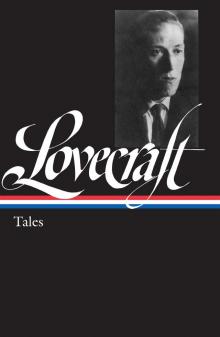 H. P. Lovecraft
H. P. Lovecraft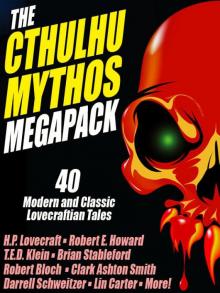 The Cthulhu Mythos Megapack
The Cthulhu Mythos Megapack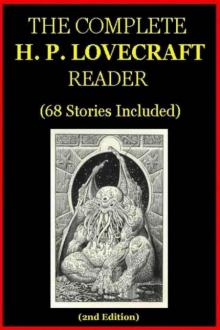 The Complete H. P. Lovecraft Reader (2nd Edition)
The Complete H. P. Lovecraft Reader (2nd Edition)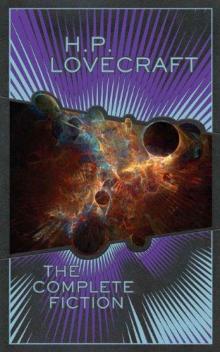 The Complete Fiction
The Complete Fiction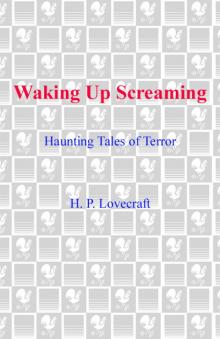 Waking Up Screaming
Waking Up Screaming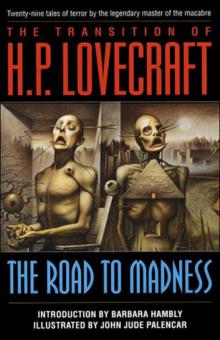 Transition of H. P. Lovecraft
Transition of H. P. Lovecraft![[1935] The Shadow Out of Time Read online](http://i1.bookreadfree.com/i2/04/12/1935_the_shadow_out_of_time_preview.jpg) [1935] The Shadow Out of Time
[1935] The Shadow Out of Time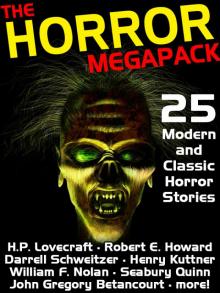 The Horror Megapack
The Horror Megapack